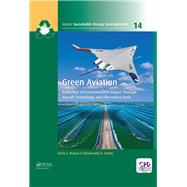- ISBN: 9780415620987 | 0415620988
- Cover: Hardcover
- Copyright: 10/17/2017
Aircraft emissions currently account for ~3.5% of all greenhouse gas emissions. The number of passenger miles has increased by 5% annually despite 9/11, two wars and gloomy economic conditions. Since aircraft have no viable alternative to the internal combustion engine, improvements in aircraft efficiency and alternative fuel development become essential. This book comprehensively covers the relevant issues in green aviation. Environmental impacts, technology advances, public policy and economics are intricately linked to the pace of development that will be realized in the coming decades. Experts from NASA and industry review current technology development in green aviation that will carry the industry through 2025 and beyond. This includes increased efficiency through better propulsion systems, reduced drag airframes, advanced materials and operational changes. Clean combustion and emission control of noise, exhaust gases and particulates are also addressed through combustor design and the use of alternative fuels. Economic imperatives from aircraft lifetime and maintaince logistics dictate the drive for "drop-in" fuels, blending jet-grade and biofuel. New certification standards for such fuels are outlined. Life Cycle Assessments are used to evaluate worldwide biofuel approaches, highlighting that there is no single rational approach for sustainable buildup. In fact, unless local conditions are considered, the use of biofuels can create a net increase in environmental impact as a result of biofuel manufacturing processes. Governmental experts evaluate current and future regulations and their impact on green aviation. Sustainable approaches to biofuel development are discussed for locations around the globe, including the US, EU, Brazil, China and India.







